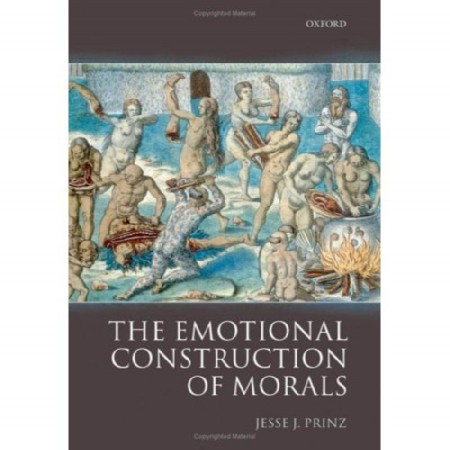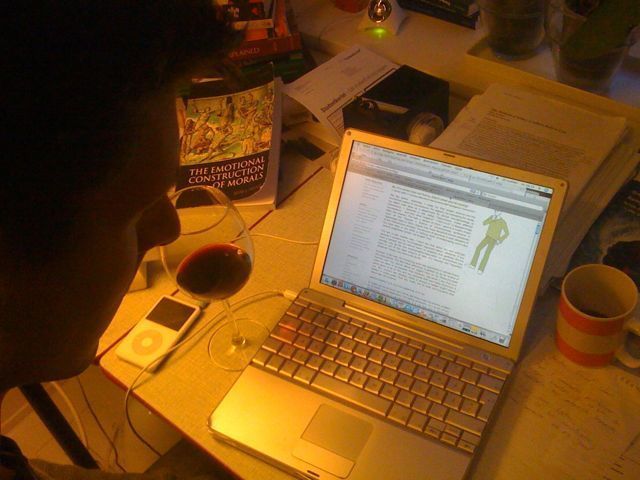Lecturing in the shower
30 oktober 2009 | In Meta-philosophy Moral Psychology Self-indulgence | Comments?I don’t sing in the shower. It’s not that I don’t sing Period, I will join in when people let me and have even been known to attempt the occasional added fifth or fourth or thereabouts. It’s just not a shower thing. I do, however, prepare lectures in that setting. Trying out how they sound and so on. Thinking is usually a rather unstructured, associative affair, and even writing these post-typewriter days has lost some of it’s definitiveness (as these rather freefloating associations of mine amply demonstrate), but Thinking Out Loud helps getting the clarity and simplicity required for getting the ideas across. Just ask the neighbors in the poorly soundproofed apartment next to ours.
Going Through the Emotions
29 oktober 2009 | In Emotion theory | Comments?Here are some words that, stringed together, are bound to make you gasp and salivate with anticipation (thus supporting the James-Lange/Tex Avery theory of emotion): The Non-Conceptual Representational Content of Emotions.
Emotions are tricky things. But what kind of tricky things are they? ”Cognitivists” believe that emotions are at least partly constituted by judgments, wereas non-cognitivists typically claim that emotions are mere experiences, uncommitted to any propositional content.
One problem for cognitivists is that judgments seem to require concepts, and we might want to say that creatures incapable of housing the relevant concepts might nevertheless experience emotions. This depends on what you require from your concept possessors: we can lower the bar, so that most animals have at least some concepts needed for certain emotions. Or we might want to exclude non-humans from the world of full-fledged emotions. Cog and Non-Cog may not disagree over the facts, but only about the terms, and the implied policies.
The problem for non-cogs is that we sometimes treat emotions as justifiable, and it is hard to see what that amounts to if emotions are not judgments. The case is analogous to perception.
Emotions can’t just be judgments since for every judgment , something could be that judgment and yet not be an emotion. I.e. even though emotions might have conceptual content, they are not exhausted by that content. We need more in order to differentiate emotions from states having the same content as an emotion.
Now, representation is a great notion to invoke here, since it’s eminently flexible: to represent somehing is a relational, i.e. non-intrinsic, feature. In order to represent something, even something propositional, you need not yourself have a propositional nature. So an emotion might be something like a pure experience, and still have non-conceptual, representational content – the ”meaning”, as it were, of the emotion, is not intrinsic to the emotion, but derived from its function. When what is represented by the emotion is a judgment, or something to that effect, we can treat it as justifiable. Analogously, again, perceptions represent things as being a certain way, but in order to represent a judgment, it need not itself be a judgment. The fear of a snake is a mental state that represents the snake as being dangerous, but it is not itself the judgment that the snake is dangerous.
Is representation essential to what you feel? Representations according to Dretske-influenced theories (Tye, Schroeder, probably Prinz), are causal, functional affairs, and it might not be obvious to you what caused your current mental state, or what function that mental state plays. In fact, seeing how one and the same mental state might represent/be caused by different things, it might not even be introspectable what you are feeling. The feeling is obvious to you, but what the feeling is saying need not be.
Are we left with enough to identify and individuate emotions? It seems not. It is not surprising that emotions have the function to represent, since practically all mental states have that function. But that is not all it does. Indeed, there are plenty of reasons to believe that emotions are not exhausted by their function, either, let alone the strictly informational one-
I believe that ”emotion” is a usefully vague notion, but that all emotions have a hedonic component. They are either positively or negatively valenced. Also, any mental state having a hedonic constituent deserves consideration as an emotion. When they are prompted by judgments, or followed by judgments, or just associated with judgments, it makes sense to assess them accordingly. In addition, you may be held responsible for an emotion, even if that emotion is not something you can directly choose to have or not too have: you might be responsible for the judgment that prompts the emotion.
–
This post was inspired by reading this book, which I’m sure will prompt (and thus then be represented by) more posts over the next few weeks):

Jesse Prinz: the Emotional Construction of Morals
Another day, another photoshoot
29 oktober 2009 | In Uncategorized | Comments?For the second time this week, I find myself drinking wine in the early afternoon, prompted by a photographer. This time, it’s my wife who is organizing the event, a december food thing. Our kitchen often looks like this.
Afternoon wine
27 oktober 2009 | In Self-indulgence | 2 CommentsThe notoriously reclusive philosopher D Brax has recently granted a few interviews to a select number of magazines. Being that Pynchonesque creature, I can tell you, means that I’m not that accustomed to dealing with photographers, and their various means of conveying meaning. Thus I found myself quite perplexedly (is that a word? Let’s go ahead and pretend it’s a word) holding a glass of red wine in the middle of the afternoon. You see, this being a wine magazine, holding said receptacle while smiling would somehow get the message across. The perplexedness (word? Let’s say it is) has yet to subside, as you will no doubt see yourself from this picture. Amazingly not a montage.
So, it’s correct but not funny, that’s what you’re saying?
11 oktober 2009 | In Comedy Meta-ethics Neuroscience Self-indulgence | Comments?The day before yesterday, I made my first proper venture into the unchartred waters of neuroscience. For reasons too interesting for words, my debut took place at a department for clinical neurophysiology in Gothenburg. I delivered a talk called ”Value-theory meets affective neuroscience – and then what happens?”. (”Not much” is disappointingly often the answer). This talk, a version of which I gave to a mostly empty room at the Towards a Science of Consciousness conference in Copenhagen back in 2005, argues that these disciplines should colloborate of key motivational concepts. The amount of ignorance in each discipline of the work done in the other is nothing short of embarrasing, and in dire need of rectification (enter: not so petit moi).
The talk is also notable (yes, I think like that about my own writings) because it contains my ”no-Cinderella” argument about reference: If you have a concept but no natural event or property that perfectly fits the concept, you go for the event/property/step-sister on which/whom you have to cut of the least amount of toes. It’s basically the ”imperfect derserver” theory, but more cute, by far.
Anyway: in the talk, I’m intrducing some key arguments in ethical theory and meta-ethics. The fact-value distinction is backed up by an outline of Hume’s Law: You cannot derive an ’ought’ from an ’is’. There are cases when we seem to do precisely this, however. Like when I say that your pants seem to be on fire, and you conclude that your really should put it out. But, Hume’s law dictates, there is always a hidden ’ought’-clause hidden in these cases. That you ought not to wear burning pants after labour-day, for instance.
Hold for laughs 2-3-4. It is not happening, is it? No.
It might not be as funny as I think, but there might be another problem to, to which I cling desperately: I’m talking philosophy to a bunch of non-philosophers, and for a non-philosopher, it is not that easy to distinguish the jokes from the real thing.
Duelling Processes
6 oktober 2009 | In Meta-ethics Moral Psychology | Comments?On Thursday, I’m supposed to summarize and criticize a draft for a paper called ”the Methods of Ethics” (yet contains no reference to Sidgwick) with the subtle subtitle ”conflicts built to last”.
The paper (intersting and very nicely written) reflects on the philosophical importance of the ”dual process” model for moral judgments and points out that having two processes influencing our moral judgments is useful since each process can correct the mistake that the other leads to on its own. In vague and possibly misleading terms, the ”emotional” process is in place to make sure that the ”cognitive” process does not run away with us (getting us stuck in prisoners dilemmas and repugnant conclusions. Also, one presumes, to keep us from making biased calculations), the cognitive process is there to make sure we don’t get stuck in emotionally reinforced prejudices.
One important role for the emotional process is to tilt the actual and perceived utilities of an option so that, for instance, a seemingly rational breach of promise becomes less tempting, due to expected guilt. (It’s a choice-archictural device, to speak with the nudge people.) The two processes are commonly held to be representative of two different moral theories. The cognitive process is broadly ”utilitarian”, and the emotional is broadly ”deontological”, spurring some philosophers to say that the dual process model is a perfect diagnosis of the history of moral philosophy. The relation between the two processes, then, is essentially a conflictual one.
It’s an interesting speculation, but there are complications.
First: there might be several decision procedures at play; the ”dualism” is merely a handy simplification with a long history, reaching us from Plato via Hume, and Jane Austen, for crying out loud.
Second: there is no reason to think that the cognitive process as such is utilitarian – there are other reasoned ways to reach a moral decision.(The empirical work on these issues is just getting started). Nor is there any reason to believe that our emotions are essentially deontological, especially seeing how our emotional systems are among the most complicated, interconnected and plastic in the brain. One can easily imagine an agent whose emotions are always targeting the utilitarian option, who is an intellectually convinced deontologist, for instance.
Third: even if our deliberation can occasionally go against our emotional reactions, what that deliberation is about, what consequences to take into account, has to be established somehow, and emotions certainly play a central role in that process.
I believe it is a mistake to see these processes as being essentially in conflict, rather than in cooperation. We are probably best of when we get the same verdict from both processes (which, admittedly, might require some negotiation) and we usually get into trouble when they don’t.
The paper proposes that the take home lesson from these findings is that we should not be that concerned with reaching the moral truth, but with reasoning correctly, i.e. using both processes. But if we have no moral truth to strive towards, or to use as a corrective tool, how do we know when we have reasoned correctly? Especially seeing how the outcome of each process depends on a number of contingent circumstances. There are infinite possibilities when it comes to what sort of a balance is struck between the two processes, so are they all equally valid?
It’s noteworthy that when considering the Prisoners Dilemma case, the way the author determine that emotional processess help us reach the right decision is by showing that it leads to the best overall consequences. It is good that we have two processes, but that goodness must somehow be assessed, and that calls for one criterion of rightness, not several.

